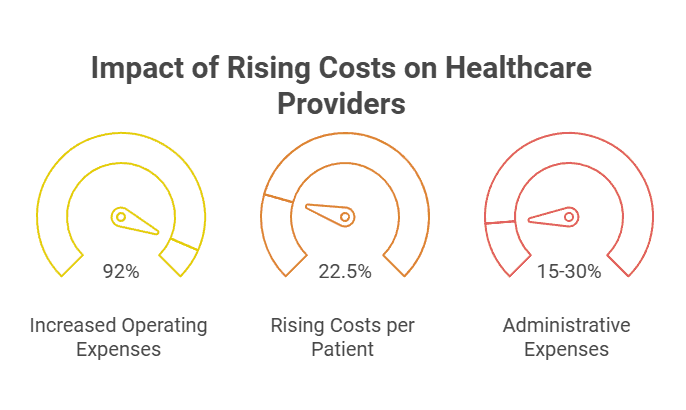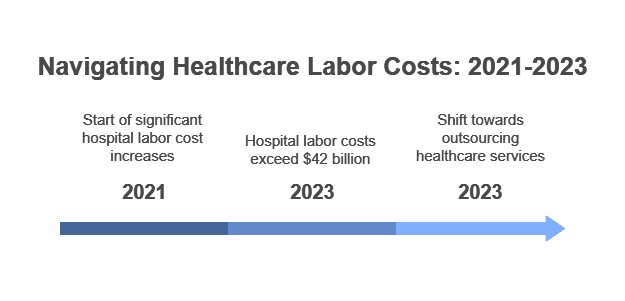In today’s fast-paced healthcare environment, outsourcing healthcare is increasingly recognized as a valuable approach to addressing operational inefficiencies. With administrative costs soaring and labor shortages becoming more pronounced, many healthcare providers are turning to outsourcing as a means to alleviate these pressures. By partnering with specialized vendors, institutions can delegate non-core tasks, allowing clinical staff to concentrate on what matters most: patient care. This article delves into The Clinic’s strategic move towards outsourcing and the remarkable outcomes that followed.
The landscape of healthcare is evolving, and outsourcing healthcare is at the forefront of this transformation. As medical facilities grapple with the complexities of modern healthcare delivery, outsourcing offers a practical solution to enhance operational efficiency and reduce costs. The Clinic’s experience serves as a case study in how effectively managing non-clinical functions through outsourcing can lead to significant improvements in service delivery and patient satisfaction. In this article, we will examine the strategic decisions made by The Clinic and the positive impact on its overall operations.
As the healthcare sector continues to face unprecedented challenges, outsourcing healthcare has emerged as a strategic necessity for many organizations. The Clinic’s proactive approach to outsourcing non-clinical tasks illustrates how this model can drive operational success while preserving high standards of patient care. By leveraging external expertise, healthcare providers can optimize their resources and focus on delivering superior patient experiences. This article provides insights into The Clinic’s journey toward effective outsourcing and the benefits realized from this strategic initiative.
Table of Contents
About The Clinic
The Clinic is a leading nonprofit academic medical center that has established itself as a pillar of excellence in healthcare delivery. With a mission centered on providing high-quality patient care, The Clinic has continuously adapted to meet the evolving needs of its patients and the healthcare landscape. In recent years, the organization recognized the pressing challenges posed by rising operational costs, labor shortages, and technological demands. To address these issues effectively, The Clinic embraced outsourcing healthcare as a strategic move to streamline operations and enhance patient experiences.
As one of the world’s largest healthcare providers, The Clinic is dedicated to maintaining high standards of care while managing its resources efficiently. However, the increasing administrative costs associated with non-clinical functions began to strain its operational capabilities. Tasks such as medical billing, IT management, and customer support were consuming valuable resources that could be better allocated to direct patient care. By adopting outsourcing healthcare, The Clinic aimed to alleviate these burdens and refocus its efforts on delivering exceptional clinical services.
In summary, The Clinic’s commitment to excellence in patient care has driven its decision to embrace outsourcing healthcare as a means of overcoming operational challenges. By strategically outsourcing non-clinical functions, The Clinic has not only reduced costs but also improved efficiency and patient satisfaction. This approach has enabled the organization to maintain its focus on delivering high-quality care while adapting to the dynamic demands of the healthcare environment. As The Clinic continues to evolve, its experience serves as a valuable case study for other healthcare institutions considering similar strategies.
Overview and Mission of The Clinic
The Clinic stands as a premier nonprofit academic medical center, dedicated to transforming healthcare through its mission of “caring for life, researching for health, and educating those who serve.” This commitment underscores the organization’s focus on delivering exceptional patient care while fostering innovation and research in the medical field. By prioritizing patient needs, The Clinic aims to be the best place for care and the best workplace in healthcare. This mission is not only about treating illnesses but also about enhancing the overall health and well-being of the communities it serves, making it a leader in the healthcare sector.
At the heart of The Clinic’s operations is a multidisciplinary approach that emphasizes teamwork and collaboration among healthcare professionals. By integrating various specialties, The Clinic ensures that patients receive comprehensive care tailored to their individual needs. This commitment to quality is reflected in its core values, which include empathy, integrity, and innovation. As The Clinic navigates the complexities of modern healthcare, it recognizes that outsourcing healthcare functions can play a crucial role in maintaining these high standards while optimizing operational efficiency.

The Clinic’s vision extends beyond immediate patient care; it encompasses a broader goal of advancing medical knowledge and improving health outcomes on a global scale. By investing in research and education, The Clinic not only enhances its service delivery but also contributes to the development of future healthcare leaders. As part of this vision, outsourcing healthcare functions allows The Clinic to allocate more resources toward research initiatives and educational programs, ultimately benefiting patients and communities alike.
Key Challenges Faced by The Clinic
Despite its strong mission and vision, The Clinic faces several significant challenges that impact its ability to deliver optimal care. One of the most pressing issues is rising operational costs, particularly in administrative areas such as billing and IT management. These increasing expenses can divert funds away from patient care initiatives, making it essential for The Clinic to explore innovative solutions like outsourcing healthcare functions. By doing so, The Clinic aims to reduce overhead costs while maintaining its commitment to high-quality patient services.
Another critical challenge is the ongoing labor shortage in non-clinical roles. As demand for healthcare services continues to grow, finding skilled workers for administrative positions has become increasingly difficult. This shortage not only affects operational efficiency but also places additional strain on existing staff. To address this issue, The Clinic has turned to outsourcing healthcare as a strategic solution. By partnering with specialized vendors, The Clinic can fill essential roles without the lengthy hiring processes associated with permanent employment.
Additionally, keeping pace with rapid technological advancements presents a formidable challenge for The Clinic. The need for robust IT infrastructure and cybersecurity measures requires significant investment and expertise. By embracing outsourcing healthcare, The Clinic can leverage external resources to manage these technological demands effectively. This approach allows the organization to stay current with innovations while focusing internal efforts on direct patient care and clinical excellence, ultimately enhancing the overall patient experience.
Identifying the Problems
The Clinic faces a multitude of operational challenges that significantly impact its ability to deliver high-quality patient care. One of the most pressing issues is the rising operational costs associated with healthcare services. As treatment and technology expenses continue to escalate, The Clinic must navigate shrinking margins and increased financial pressures. This situation is exacerbated by high labor costs and pharmaceutical expenses, which have been on the rise due to inflation and supply chain issues.
To combat these financial strains, The Clinic recognized the potential of outsourcing healthcare functions as a means to reduce administrative costs while maintaining its commitment to quality care. According to a report by Healthcare Catalyst, outsourcing can help hospitals address financial challenges by allowing them to focus resources on core clinical activities while managing costs more effectively (Healthcare Catalyst).
Another critical challenge confronting The Clinic is the persistent staffing shortages in both clinical and non-clinical roles. The demand for healthcare professionals has surged, but the supply has not kept pace, leading to significant gaps in staffing. Reports indicate that the U.S. could face shortages of hundreds of thousands of healthcare workers in the coming years, particularly in nursing and administrative support roles (Forbes).
This shortage not only affects operational efficiency but also contributes to employee burnout among existing staff, who are often overwhelmed by increased workloads. By outsourcing healthcare, The Clinic aims to alleviate these staffing pressures and ensure that essential functions are adequately staffed without compromising patient care.In addition to rising costs and staffing shortages, The Clinic grapples with the complexities of technology integration within its operations.
The rapid advancement of medical technology necessitates continuous investment in new systems and training for staff, which can strain resources further. Moreover, many healthcare organizations struggle with interoperability issues among electronic health records (EHRs), leading to inefficiencies in patient data management and care delivery.
By adopting outsourcing healthcare strategies, The Clinic can leverage specialized vendors who offer expertise in technology management, allowing for smoother integration of new systems while freeing up internal resources to focus on direct patient care and clinical excellence. As highlighted by various studies, managing these technological demands through outsourcing can significantly enhance operational efficiency (ResearchGate).
Rising Operational Costs in Healthcare
Rising operational costs represent a significant challenge for healthcare providers, including The Clinic. A recent poll by MGMA found that 92% of medical group leaders reported increased operating expenses in 2024 compared to the previous year, reflecting a trend that has been exacerbated by inflation and other economic pressures (MGMA). The cumulative effect of these rising costs is particularly pronounced in areas such as labor, pharmaceuticals, and administrative expenses.

For instance, hospitals have seen their total expenses per patient rise by 22.5% from 2019 to 2022, driven largely by higher wages and increased demand for services (GHX). To address these financial strains, many healthcare organizations are exploring outsourcing healthcare functions as a strategic approach to reduce costs while maintaining quality care.The increasing complexity of healthcare operations has also contributed to rising costs.
Administrative expenses alone can account for 15-30% of total healthcare spending, which adds a substantial financial burden on providers (AHA). Moreover, the high cost of drugs has become a persistent issue, with hospitals spending over $115 billion on drug expenses in 2023 alone (AHA). As hospitals grapple with these escalating costs, outsourcing healthcare functions offers a potential solution by allowing organizations to streamline operations and focus on core clinical activities. By delegating non-clinical tasks such as billing and IT management to specialized vendors, healthcare providers can alleviate some of the financial pressures they face.
In light of these challenges, it is clear that addressing rising operational costs is crucial for the sustainability of healthcare organizations. The integration of outsourcing healthcare strategies can not only help reduce expenses but also enhance operational efficiency. As providers seek to navigate this complex landscape, leveraging external expertise may prove essential in maintaining high standards of patient care while managing financial constraints effectively.
Labor Shortages Impacting Non-Clinical Roles
Labor shortages are another pressing challenge facing The Clinic and many other healthcare organizations today. The demand for skilled professionals in both clinical and non-clinical roles has surged in recent years; however, the supply has not kept pace. According to reports, the U.S. could face shortages of hundreds of thousands of healthcare workers in the coming years, particularly affecting nursing and administrative support positions (Forbes).
This shortage not only impacts operational efficiency but also leads to increased workloads for existing staff, resulting in burnout and decreased job satisfaction. To mitigate these effects, The Clinic is considering outsourcing healthcare functions as a viable strategy to fill critical gaps in staffing.The reliance on temporary or contract labor has become increasingly common as hospitals strive to maintain adequate staffing levels amidst these shortages.

Between 2021 and 2023, hospital labor costs increased by over $42 billion, highlighting the financial strain associated with hiring additional staff (AHA). Many organizations are turning to outsourcing healthcare as a way to access specialized talent without the long-term commitment associated with permanent hires. By partnering with external vendors who can provide administrative support and other essential services, The Clinic can alleviate some of the pressure on its internal workforce while ensuring that critical functions continue uninterrupted.
Overall, addressing labor shortages through outsourcing healthcare presents an opportunity for organizations like The Clinic to enhance their operational resilience. By leveraging external resources, healthcare providers can adapt more quickly to changing demands while maintaining their focus on delivering high-quality patient care. As the industry continues to evolve, finding innovative solutions to staffing challenges will be vital for sustaining effective healthcare delivery.
Technological Demands and Infrastructure Needs
The rapid advancement of technology in healthcare is both an opportunity and a challenge for organizations like The Clinic. As new medical technologies emerge and patient care becomes increasingly data-driven, there is a pressing need for robust IT infrastructure and cybersecurity measures. However, keeping up with these technological demands requires significant investment in both systems and training for staff (PwC). Many healthcare providers struggle with integrating new technologies into their existing operations while ensuring compliance with regulatory standards. This complexity often leads to increased operational costs that can strain already tight budgets.
To effectively manage these technological demands, many organizations are exploring outsourcing healthcare functions related to IT management and support services. By partnering with specialized vendors who possess the expertise needed for technology integration and maintenance, The Clinic can leverage external resources to enhance its operational efficiency without incurring the high costs associated with developing these capabilities internally (R1 RCM). Outsourcing IT functions allows The Clinic to focus its internal resources on direct patient care while ensuring that technological infrastructure remains up-to-date and secure.
Ultimately, embracing outsourcing healthcare strategies related to technology management can help The Clinic navigate the complexities of modern healthcare delivery more effectively. By leveraging external expertise and resources, organizations can stay ahead of technological advancements while maintaining high standards of patient care. As the industry continues to evolve at a rapid pace, finding innovative solutions to manage technological demands will be essential for sustaining operational success in the future.
Objectives of Outsourcing Healthcare
The primary objective of outsourcing healthcare is to enhance operational efficiency by allowing healthcare providers to focus on their core competencies. By delegating non-clinical functions such as administrative tasks, billing, and IT management to specialized vendors, healthcare organizations can streamline their operations and improve overall productivity.
This shift enables clinical staff to dedicate more time and resources to patient care, which is essential for improving health outcomes. Outsourcing administrative functions can lead to better human resource management and effective IT administration, allowing healthcare professionals to concentrate on diagnosing and treating patients.
Another significant objective of outsourcing healthcare is cost reduction. By partnering with external service providers, healthcare organizations can often achieve lower operational costs compared to maintaining in-house teams. This is particularly important in an era where rising operational costs pose a significant challenge for many healthcare facilities.
Outsourcing allows organizations to manage their budgets more effectively by eliminating long-term commitments associated with hiring full-time staff, such as salaries and benefits. As noted in a report by Connext Global, outsourcing medical staff can lead to substantial cost savings and financial flexibility, enabling healthcare facilities to pay for services only when needed. By achieving these objectives through outsourcing, The Clinic can enhance its ability to deliver high-quality patient care while navigating the complexities of the healthcare landscape.
Goals for Cost Reduction
One of the primary goals of outsourcing healthcare is to achieve significant cost reductions across various operational areas. As healthcare providers face escalating expenses, outsourcing non-core functions such as billing, coding, and administrative tasks can lead to substantial savings. By partnering with specialized vendors, organizations can convert fixed costs into variable costs, allowing for greater financial flexibility. This approach not only reduces labor costs associated with hiring and training in-house staff but also minimizes overhead expenses related to maintaining facilities and equipment (MyEMED). Such cost savings can be redirected toward enhancing patient care services and investing in new technologies that improve overall healthcare delivery.
Furthermore, outsourcing can streamline revenue cycle management, which is crucial for maintaining a healthy cash flow. By delegating tasks like medical billing and claims processing to experienced third-party providers, healthcare organizations can ensure timely and accurate billing, thereby reducing the risk of missed charges and enhancing reimbursement rates (NEMB Group). This not only improves financial performance but also allows internal staff to focus on patient-facing activities rather than administrative burdens. Ultimately, the goal of outsourcing healthcare is to create a more efficient financial model that supports the organization’s mission of delivering high-quality care while managing costs effectively.
Enhancing Operational Efficiency through Outsourcing
Another key objective of outsourcing healthcare is to enhance operational efficiency within healthcare organizations. By leveraging the expertise of specialized service providers, healthcare facilities can optimize their workflows and reduce inefficiencies that often plague in-house operations.
For instance, outsourcing functions such as medical transcription or patient scheduling allows organizations to benefit from faster turnaround times and improved accuracy, which are critical in maintaining high standards of patient care. This efficiency not only leads to better resource allocation but also enhances the overall patient experience by ensuring that administrative processes do not hinder timely access to care.Moreover, outsourcing enables healthcare organizations to access advanced technologies without the burden of substantial capital investment.
Many outsourcing partners offer state-of-the-art systems for managing electronic health records (EHRs) and other critical applications that might be cost-prohibitive for individual organizations to implement independently. This access to technology allows healthcare providers to stay competitive in an increasingly digital landscape while focusing their internal resources on core clinical competencies. By achieving these efficiencies through outsourcing healthcare, organizations can improve their service delivery and ultimately enhance patient outcomes.
Maintaining High Standards of Patient Care
Maintaining high standards of patient care is a fundamental objective for healthcare organizations considering outsourcing healthcare functions. While cost reduction and operational efficiency are important, they should never come at the expense of quality care. By outsourcing non-clinical tasks, healthcare providers can free up valuable time and resources for clinical staff, allowing them to focus more on direct patient interactions and treatment.
This shift not only improves job satisfaction among healthcare workers but also enhances the overall patient experience by ensuring that patients receive timely attention and care. Additionally, outsourcing can lead to improved accuracy in administrative processes such as billing and coding, which are critical for ensuring proper reimbursement and compliance with regulations.
Errors in these areas can result in delayed payments or denied claims, ultimately affecting the quality of services provided. By partnering with specialized vendors who excel in these non-clinical functions, healthcare organizations can mitigate risks associated with administrative errors while maintaining a strong focus on delivering high-quality patient care. In this way, outsourcing healthcare serves as a strategic tool that supports both operational goals and the overarching mission of providing exceptional medical services.
The Outsourcing Strategy
The outsourcing strategy implemented by The Clinic is designed to optimize operational efficiency while maintaining high standards of patient care. By strategically delegating non-clinical functions such as medical billing, IT management, and customer service to specialized external providers, The Clinic can focus its resources on core clinical activities that directly impact patient outcomes. This approach not only reduces administrative burdens but also allows healthcare professionals to dedicate more time to patient interactions, ultimately enhancing the overall quality of care.
As noted by Healthcare Outsourcing experts, this strategic move enables organizations to leverage external expertise and advanced technologies that may not be readily available in-house. To ensure the success of its outsourcing initiatives, The Clinic follows best practices that include thorough vendor selection, clear communication, and continuous performance monitoring. Selecting the right outsourcing partner is crucial; providers must demonstrate expertise in healthcare operations and adhere to stringent compliance standards. By establishing well-defined expectations and maintaining open lines of communication with outsourcing partners, The Clinic can foster a collaborative environment that promotes transparency and accountability.
Regular audits and performance assessments further ensure that outsourced services meet the required quality standards, allowing The Clinic to adapt its strategy as needed while continuing to prioritize exceptional patient care through effective outsourcing healthcare practices.
Selection Criteria for Outsourcing Partners
When selecting an outsourcing partner for healthcare functions, it is crucial to establish clear criteria that align with the organization’s goals and operational needs. One of the primary considerations is the partner’s industry expertise and experience in specific healthcare domains. A suitable outsourcing partner should have a proven track record in managing services relevant to the organization’s requirements, such as medical billing, coding, or IT management. This expertise ensures that the partner can navigate the complexities of healthcare regulations and compliance, which are critical for maintaining patient confidentiality and data security.
Additionally, evaluating the partner’s reputation through client testimonials and case studies can provide insights into their reliability and quality of service.Another important factor in the selection process is the ability of the outsourcing partner to offer customized solutions tailored to the specific needs of The Clinic. This involves assessing their flexibility in adapting to changing requirements and their commitment to delivering results that align with organizational objectives.
A successful partnership in outsourcing healthcare hinges on clear communication channels and a shared understanding of goals between both parties. Establishing performance metrics and service level agreements (SLAs) upfront can help set expectations and ensure accountability throughout the collaboration By carefully considering these criteria, healthcare organizations like The Clinic can forge partnerships that enhance operational efficiency while maintaining high standards of patient care.
Medical Billing and Coding
Outsourcing healthcare functions such as medical billing and coding has become a strategic move for many healthcare organizations seeking to improve efficiency and reduce costs. Medical billing involves the administration of billing processes and accounts receivable for healthcare providers, while coding translates medical services into standardized codes for insurance claims. By outsourcing these tasks to specialized vendors, healthcare facilities can benefit from the expertise of professionals who are well-versed in complex coding systems such as CPT and ICD-10.
This not only enhances the accuracy of claims submitted but also expedites the reimbursement process, leading to improved cash flow for providers. Furthermore, outsourcing medical billing and coding allows clinical staff to focus on patient care rather than administrative tasks, ultimately enhancing the overall patient experience.The financial implications of outsourcing healthcare functions like medical billing and coding are significant. Organizations can save on labor costs associated with hiring, training, and maintaining an in-house team, which can be particularly burdensome for small to mid-sized facilities.
Additionally, outsourcing provides access to advanced technologies and systems that may be cost-prohibitive for individual organizations to implement independently. This shift not only improves operational efficiency but also ensures compliance with evolving healthcare regulations, reducing the risk of costly errors and penalties. By leveraging specialized expertise through outsourcing, healthcare providers can enhance their revenue cycle management while maintaining high standards of care.
IT Infrastructure Management
Outsourcing healthcare functions related to IT infrastructure management is another critical strategy that healthcare organizations are increasingly adopting. As technology becomes integral to patient care delivery, maintaining robust IT systems is essential for operational success. Outsourcing IT management allows healthcare providers to access advanced technological solutions without the substantial costs associated with building and maintaining an in-house IT department. Specialized IT service providers can offer expertise in areas such as data storage, cybersecurity, and software updates, ensuring that healthcare facilities remain compliant with regulatory standards while safeguarding sensitive patient information.
Moreover, by outsourcing IT infrastructure management, healthcare organizations can enhance their operational efficiency and focus on delivering quality patient care. External IT experts can implement best practices for system integration and data management, which are crucial for optimizing workflows within healthcare settings. This partnership not only mitigates risks associated with managing complex IT environments but also allows clinical staff to concentrate on their primary responsibilities without the distraction of technical issues (360 Contact BPO). Ultimately, outsourcing IT functions empowers healthcare providers to stay competitive in a rapidly evolving digital landscape while ensuring that they maintain high standards of patient care.
Medical Transcription Services
Outsourcing healthcare functions such as medical transcription services is a strategic choice that enhances operational efficiency within healthcare organizations. Medical transcription involves converting voice-recorded reports dictated by physicians into written text, which is essential for maintaining accurate medical records. By outsourcing these services to specialized vendors, The Clinic can improve turnaround times for documentation while ensuring that clinical staff can dedicate more time to direct patient interactions.
This not only streamlines the documentation process but also reduces the risk of errors that may occur with in-house transcription efforts.Furthermore, outsourcing medical transcription allows healthcare providers to benefit from advanced technologies that enhance accuracy and compliance with regulatory requirements. Many transcription service providers utilize sophisticated software solutions that facilitate seamless integration with electronic health records (EHR) systems, improving overall workflow efficiency.
By leveraging external expertise in medical transcription, organizations can ensure timely and precise documentation while freeing up internal resources to focus on delivering high-quality patient care. This strategic move aligns with the broader goals of outsourcing healthcare, enabling facilities like The Clinic to optimize their operations effectively.
Call Center & Customer Service Support
Outsourcing healthcare functions related to call center and customer service support is increasingly recognized as a vital strategy for enhancing patient engagement and satisfaction. Managing appointment scheduling, patient inquiries, and follow-up communications can be resource-intensive and distract clinical staff from their primary responsibilities. By partnering with specialized call centers that focus on healthcare services, organizations can ensure that patients receive timely responses and assistance without overwhelming internal staff.
This not only improves the overall patient experience but also allows healthcare providers to maintain a strong focus on delivering quality care.Additionally, outsourced call center services can provide valuable insights into patient needs and preferences through data collection and analysis.
These insights enable healthcare organizations to tailor their services more effectively and improve communication strategies. By leveraging external expertise in customer service management, The Clinic can enhance its operational efficiency while ensuring that patients feel valued and supported throughout their care journey. Ultimately, outsourcing healthcare functions like call center support contributes significantly to improved patient satisfaction and better health outcomes.
Implementation Process
The implementation process for outsourcing healthcare functions is a critical step that ensures the successful integration of external services into an organization’s operations. Initially, healthcare organizations must conduct a comprehensive assessment to identify which specific tasks or functions are suitable for outsourcing, such as medical billing, IT management, or customer service support. This assessment involves evaluating the internal processes, resource constraints, and the potential impact of outsourcing on overall efficiency.
Once the appropriate functions are identified, the next step is to select a suitable outsourcing partner based on criteria such as industry expertise, cost-effectiveness, and compliance with healthcare regulations. Establishing clear project requirements, timelines, and compliance measures is essential to ensure that both parties have aligned expectations.After selecting an outsourcing partner, the healthcare organization must facilitate a smooth transition of responsibilities. This includes providing the necessary guidance and resources to the outsourcing team while maintaining open lines of communication throughout the process. Regular monitoring of performance metrics and quality assurance measures is crucial to ensure that the outsourced tasks are executed efficiently and meet established standards.
By implementing these steps effectively, healthcare organizations can not only reduce operational burdens but also enhance patient care quality through improved resource allocation. Ultimately, a well-structured implementation process is vital for maximizing the benefits of outsourcing healthcare initiatives while ensuring compliance and maintaining high standards of service delivery.
Steps Taken to Integrate Outsourcing Solutions
The integration of outsourcing healthcare solutions involves several key steps that ensure a seamless transition from in-house operations to external partnerships. Initially, healthcare organizations must conduct a thorough assessment to identify which specific functions are suitable for outsourcing, such as medical billing, IT management, or customer service support. This assessment helps establish clear objectives and expectations for the outsourcing arrangement, ensuring that both parties are aligned from the start.
Once the appropriate functions are identified, the organization selects a suitable outsourcing partner based on their expertise, track record, and ability to meet compliance standards. Establishing project requirements, timelines, and performance metrics is crucial during this phase to ensure that the outsourced tasks align with the organization’s operational goals.After selecting an outsourcing partner, healthcare organizations must facilitate the transfer of responsibilities through effective communication and collaboration. This includes providing the necessary guidance and resources to the outsourcing team while maintaining open lines of communication throughout the process.
Regular monitoring of performance metrics and quality assurance measures is essential to ensure that the outsourced tasks are executed efficiently and meet established standards. By implementing these steps effectively, healthcare organizations can not only reduce operational burdens but also enhance patient care quality through improved resource allocation. Ultimately, a well-structured integration process is vital for maximizing the benefits of outsourcing healthcare initiatives while ensuring compliance and maintaining high standards of service delivery.
Training and Transition for Staff in the Context of Outsourcing Healthcare
Training and transitioning staff during the outsourcing healthcare process is a critical component that can significantly impact the success of the partnership. Even though outsourcing partners may have extensive experience in healthcare services, it is essential for them to understand the specific workflows, culture, and expectations of the organization they are serving. Comprehensive onboarding programs should be established to familiarize outsourced teams with internal processes, policies, and technology systems used within the healthcare facility.
This training ensures that all team members are aligned in their objectives and can work collaboratively towards common goals.Additionally, ongoing support and communication play a vital role in ensuring a smooth transition for both internal staff and outsourced teams. Regular updates, feedback loops, and performance evaluations help maintain transparency and address any potential issues early on.
By fostering a culture of collaboration between internal staff and outsourced partners, healthcare organizations can enhance operational efficiency while ensuring that quality patient care remains at the forefront of their mission. This strategic approach to training and transition not only optimizes resource utilization but also reinforces the overall goals of outsourcing healthcare initiatives within the organization.
Results and Outcomes
Achievements in Cost Reduction through Outsourcing Healthcare
The implementation of an outsourcing strategy at The Clinic has led to significant achievements in cost reduction, particularly in administrative expenses. By outsourcing critical functions such as medical billing, transcription, and IT services, The Clinic realized a remarkable 20% reduction in administrative costs. This financial relief allowed the organization to reallocate resources toward enhancing patient care initiatives. The savings generated from outsourcing healthcare functions not only alleviated budgetary pressures but also provided an opportunity for The Clinic to invest in new technologies and services that directly benefit patients.
Improvements in Operational Efficiency Metrics
In addition to cost savings, outsourcing healthcare has resulted in substantial improvements in operational efficiency metrics at The Clinic. For instance, the organization experienced a 30% increase in the speed of medical billing and coding processing times, which significantly streamlined administrative workflows. This enhanced efficiency enabled staff to focus more on patient-facing activities rather than getting bogged down by paperwork. Moreover, there was a 50% reduction in transcription turnaround times due to the use of offshore medical transcription services, which further improved the overall efficiency of healthcare providers. These operational gains underscore the effectiveness of outsourcing as a strategy for optimizing healthcare delivery.
Increased Patient-Facing Time for Clinical Staff
One of the most notable benefits of outsourcing healthcare functions has been the increase in patient-facing time for clinical staff. By offloading administrative duties to external vendors, clinical teams were able to dedicate more time to direct patient interactions, which is crucial for improving overall patient satisfaction. This shift not only enhances the quality of care provided but also fosters stronger relationships between healthcare providers and patients. As clinical staff spent less time on paperwork and more time attending to patients’ needs, The Clinic was able to create a more patient-centered environment that prioritizes health outcomes.
Scalability and Flexibility Benefits of Outsourcing
Outsourcing healthcare has also provided The Clinic with scalability and flexibility benefits that are essential in today’s dynamic healthcare environment. With the ability to quickly adjust operations based on fluctuating patient demand, The Clinic can scale its workforce without the need for hiring additional permanent staff. This adaptability is particularly valuable during peak periods or unexpected surges in patient volume, allowing the organization to maintain high levels of service without compromising quality. By leveraging external resources through outsourcing, The Clinic can respond swiftly to changing circumstances while ensuring that patient care remains a top priority.
Quality of Patient Care Maintained Post-Outsourcing
Despite concerns about potential compromises in patient care quality when outsourcing functions, The Clinic has successfully maintained high standards post-outsourcing. The strategic decision to partner with specialized vendors ensured that there was no decline in the quality of patient interactions or overall care delivery. In fact, quicker administrative processes resulting from outsourcing have enhanced the patient experience by reducing wait times and improving service efficiency. By focusing on core clinical activities while relying on external partners for non-clinical tasks, The Clinic has demonstrated that outsourcing healthcare can be effectively integrated into its operations without sacrificing the quality of care delivered to patients.
Case Study Analysis
Comparative Analysis with Other Institutions Utilizing Outsourcing Healthcare
A comparative analysis of outsourcing healthcare practices reveals significant benefits experienced by various institutions that have adopted similar strategies. For instance, a case study of a radiology management group on the U.S. East Coast demonstrated how outsourcing medical billing led to improved productivity and cash flow. By partnering with a specialized medical billing firm, the group was able to reduce backlog issues and enhance the accuracy of claims submissions. This resulted in an increase in the percentage of patients on protocol from 60% to 90%, and a notable improvement in revenue, particularly for diabetic patients, which increased by over $2,500 monthly.
Such outcomes illustrate how effective outsourcing can lead to enhanced operational efficiency and financial stability within healthcare organizations.Similarly, a study conducted in Sindh, Pakistan, highlighted the positive effects of outsourcing primary healthcare services. The contracted Basic Health Units (BHUs) managed by a non-governmental organization demonstrated significant improvements in service quality compared to those administered by district governments.
Key metrics such as infrastructure quality, availability of essential medicines, and staff punctuality were notably better in the outsourced facilities (BMC Health Services Research). This case underscores the potential for outsourcing healthcare to enhance service delivery, particularly in regions where public sector capacity is limited. Overall, these comparative analyses indicate that outsourcing can be an effective strategy for improving both operational performance and patient care across diverse healthcare settings.
Conclusion
The Clinic’s strategic initiative in outsourcing healthcare has led to significant reductions in operational costs, enhanced efficiency, and enabled clinical teams to concentrate on providing superior patient care. The successful integration of outsourcing solutions has not only optimized administrative functions but also safeguarded the institution’s reputation for excellence in healthcare services.
This case study illustrates how thoughtful and well-executed outsourcing can serve as a transformative strategy within the healthcare sector, driving both operational success and high-quality patient outcomes. By leveraging external expertise, The Clinic has demonstrated that outsourcing can effectively support its mission to deliver exceptional care while navigating the complexities of modern healthcare demands.




